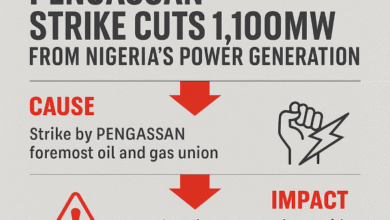New dawn as Nigeria launches eNaira digital currency

President Muhammadu Buhari, on Monday, launched Nigeria’s central bank digital currency (CBDC), the eNaira. The launch took place at the State House in Nigeria’s capital Abuja after a previous plan to unveil the digital currency on October 1 was put on hold.
Nigeria is one of the five countries in the world to develop an official digital currency. 14 other countries are at the pilot stages of launching theirs, according to the Atlantic Council’s CBDC tracker.
The adoption of the Central Bank Digital Currency (CBDC) and its underlying technology, called blockchain, can increase Nigeria’s GDP by $29billion over the next 10 years, President Muhammadu Buhari said Monday in Abuja at the official launch of the eNaira.
The Central Bank of Nigeria (CBN) engaged a Barbados-based digital financial technology firm, Bitt Inc, as a technical partner to develop the e-Naira.
The President also declared that the introduction of the eNaira would enable the government to send direct payments to citizens eligible for specific welfare programmes as well as foster cross-border trade.
President Buhari said that alongside digital innovations, CBDCs can foster economic growth through better economic activities, increase remittances, improve financial inclusion and make monetary policy more effective.
”Let me note that aside from the global trend to create Digital Currencies, we believe that there are Nigeria-specific benefits that cut across different sectors of, and concerns of the economy.
”The use of CBDCs can help move many more people and businesses from the informal into the formal sector, thereby increasing the tax base of the country,” he said.
The President said with the launch of eNaira, Nigeria has become the first country in Africa, and one of the first in the world to introduce a Digital Currency to her citizens.
He commended the Governor of the Central Bank, Godwin Emefiele, his deputies and the entire team of staff who worked tirelessly to make the launch of Africa’s first digital currency a reality.
In a statement by the President’s Senior Special Adviser on Media, Femi Adesina, the President, who assured Nigerians of the safety and scalability of the CBDC system, said the journey to create a digital currency for Nigeria began sometime in 2017.
”Work intensified over the past several months with several brainstorming exercises, deployment of technical partners and advisers, collaboration with the Ministries of Communication and Digital Economy and its sister agencies like the Nigerian Communications Commission (NCC), integration of banking software across the country and painstaking tests to ensure the robustness, safety and scalability of the CBDC System, ” he said.
The President also used the occasion of the unveiling of the eNaira to painstakingly explain to Nigerians why he approved the use of the digital currency.
”In recent times, the use of physical cash in conducting business and making payments has been on the decline. This trend has been exacerbated by the onset of the COVID-19 pandemic and the resurgence of a new Digital Economy.
”Alongside these developments, businesses, households, and other economic agents have sought for new means of making payments in the new circumstances.
”The absence of a swift and effective solution to these requirements, as well as fears that Central Banks’ actions sometimes lead to hyperinflation created the space for non-government entities to establish new forms of “private currencies” that seemed to have gained popularity and acceptance across the world, including here in Nigeria.
”In response to these developments, an overwhelming majority of Central Banks across the world have started to consider issuing digital currencies in order to cater for businesses and households seeking faster, safer, easier and cheaper means of payments. A handful of countries including China, Bahamas, and Cambodia have already issued their own CBDCs.”
”A 2021 survey of Central Banks around the world by the Bank for International Settlements (BIS) found that almost 90 per cent are actively researching the potential for CBDCs, 60 percent were experimenting with the technology and 14 per cent were deploying pilot projects.
”Needless to add, close monitoring and close supervision will be necessary in the early stages of implementation to study the effect of eNaira on the economy as a whole.
”It is on the basis of this that the Central Bank of Nigeria (CBN) sought and received my approval to explore issuing Nigeria’s own Central Bank Digital Currency, named the eNaira,’’ he said.
Equally, the Nigerian leader noted that his approval was also underpinned by the fact that the CBN has been a leading innovator ‘‘in the form of money they produce, and in the payment services they deploy for efficient transactions.’’
He noted that Nigeria’s apex bank has invested heavily in creating a Payment System that is ranked in the top ten in the world and certainly the best in Africa.
”This payment system now provides high‐value and time‐critical payment services to financial institutions, and ultimately serves as the backbone for every electronic payment in Nigeria.
”They have also supported several private‐sector initiatives to improve the existing payments landscape, and in turn, have created some of the world’s leading payment service providers today,’’ he said.











